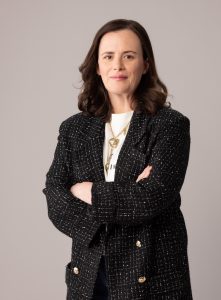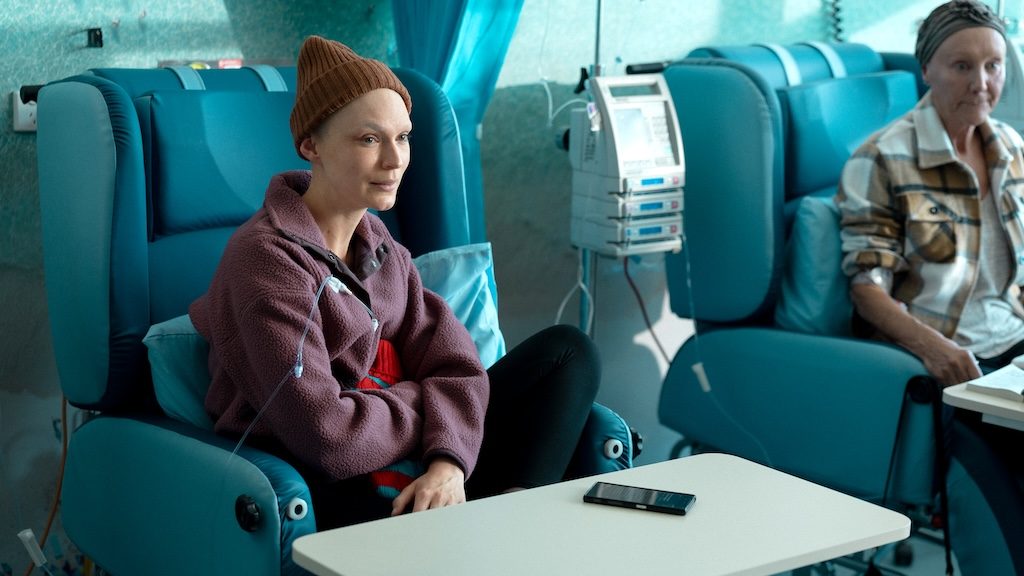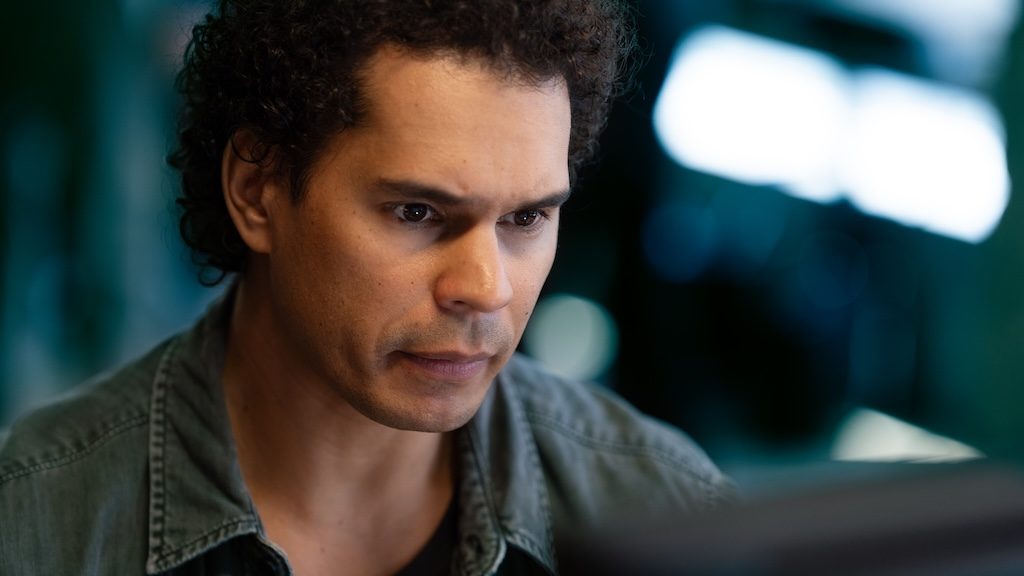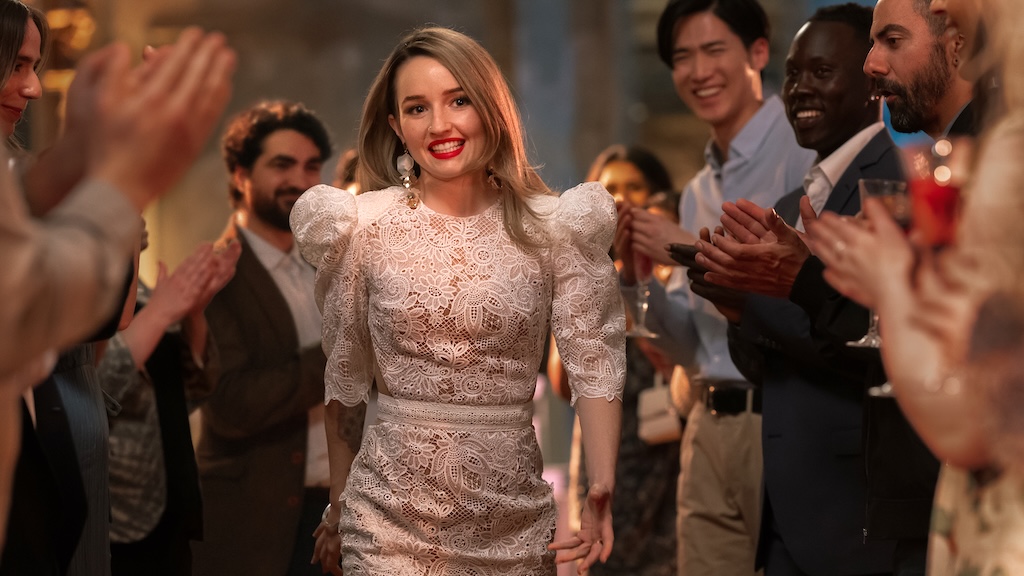Ever heard of Belle Gibson? Wellness “scamfluencer” who convinced thousands of people that she could cure cancer through sensible nutrition. She’s now the subject of Samantha Strauss’ (Nine Perfect Strangers) television series called Apple Cider Vinegar – a tablespoon a day cures all that ails you! So long as you also visit a pricey wellness retreat and download her app.
Samantha adapted the limited series from journalists Beau Donelly and Nick Toscano’s book, The Woman Who Fooled the World which chronicles the brazen fraud. Back in 2015, they broke the explosive story of Gibson lying about her sizeable charitable donations and her empire of lies was unveiled.
Audiences have embraced stories of bold and shameless fraudsters such as Anna Delvey and Elizabeth Holmes who screwed investors and ordinary people big time.

Samantha Strauss. Photo courtesy of Bond University
We started our conversation about Apple Cider Vinegar with Samantha Strauss by asking her about the psychology of such characters. What drives them to act in this way and why do audiences enjoy watching them on screen?
“I both admire and am repulsed by their audacity to lie. They have opportunities to take the right path, and as they dig down deeper, they want to be bigger and bigger. There’s a ruthlessness,” explains Strauss.
From the audience’s perspective, they eventually want to see these characters “have their comeuppance and have justice prevail.” We understand that we may have exaggerated certain health claims like “I’m too sick to come into work,” (be honest), but faking brain cancer takes bending the truth to a whole new level.
Such larger than life fraudsters are often motivated by greed, power, or fame. In Belle Gibson’s case (Kaitlyn Dever), it was by love and attention that’s lacking from her life.
Adapting The Novel
Samantha Strauss was immediately captivated by the novel because it was more than a story of a criminal being caught.
“What I loved about their book is it wasn’t just the rise and the fall of a grifter. They really looked at the unregulated wellness industry. They looked at cancer scammers across history and they looked at real people who really did have cancer, who followed Belle and her advice and her recipes,” shares Strauss.
A large part of their exhaustive investigative journalism involved consulting doctors and neurosurgeons rebutting unfounded claims by the wellness ecosystem. “I just loved that they painted this whole big rich tapestry.”
Strauss didn’t want to glorify Gibson despite her importance in showcasing other health and wellness influencers. Strauss was only prepared to give Belle enough screen time so audiences might stand in her shoes and postulate her motives.
As a counter balance in Apple Cider Vinegar, the character of Lucy (Tilda Cobham-Hervey), who did have cancer and succumbed to Belle’s lies.

Lucy (Tilda Cobham-Hervey) Photo courtesy of Netflix
The book had many suitors, but Strauss ultimately won the prize. “I had to pitch that the book and I had to give Netflix Australia my take. They liked it and they trusted me. We consulted them about journalism, processes and other details when needed.”
The writers’ room comprised of Samantha Strauss, Angela Betzien, and Anya Beyersdorf.
“We had four ‘luxurious’ days to plot the series. And then four days to plot each episode. We were able to figure out our timelines and go deep into the nuances of the characters.” The writers were mothers with toddlers at the time, so they drew on that experience to inform Belle’s experience of being in a similar position.
Medical Science Doesn’t Have All The Answers
A running theme in Apple Cider Vinegar is the manipulation of truths to become lies and the line that blurs the two. There are also valid questions posed regarding traditional versus alternative medicine. But Belle is no sympathetic character in this debate.
“Belle lies constantly. This is an indictment on a lot of wellness practices, particularly when they have encouraged people to turn away from science and medicine. It was really important to balance that because doctors don’t have all the answers. They may not always have the best bedside manner. Western medicine hasn’t even wanted to think about nutrition,” adds Strauss.
Alma Hirsch (Robin Nevin) is like a cult leader who runs the dubious Hirsch Institute in Mexico. She tells the experience of her father trying to explain the importance of nutrition in treating health and disease to the American Medical Association and was swiftly dismissed as a quack.
Many people feel disenfranchised and skeptical of the Medical Industrial Complex. So they turn to alternative medicine often devoid of adequate clinical data. “We wanted to explore the scam within wellness and the people who are beautiful and healthy who are selling you this idea of hope in a bottle if you pay the money.”
The scam relies on sick people giving over their power to cure themselves to these scammers. It’s too easy to fall down a social media rabbit hole. Cancer patients may undergo traditional therapies which may or may not work as desired.
The debate boils down to exaggerated or baseless scientific claims versus telling outright lies to simply sell a product. That’s not to say that there isn’t a place for both approaches in a patient’s treatment regimen.
“In Apple Cider Vinegar, Lucy hopefully ends in integration and balance. She does yoga and meditation. She has ice baths, cold plunges and drinks juices. But she also has chemotherapy. And she’s listening to her doctors. There’s a balance to be found.”

Justin (Mark Coles Smith) Photo courtesy of Netflix
Apple Cider Vinegar doesn’t declare a winner in its intent. “Perhaps it’s in listening to each other more, that greater harmony can be found” argues Strauss. “That was what we tried to do with Justin’s (Mark Coles Smith) character, the journalist and Lucy’s husband. He’s quite arrogant in his approach to her treatment. He wants her to just listen and do as she’s told. He doesn’t want to give her space to be the better human being that she is, who’s on her own journey.”
“And in the end, he has to face that the person he loves the most in the world, might die and how frightening that is… but you can’t control that either.”
Introducing Belle Gibson
Apple Cider Vinegar opens with Belle Gibson in crisis mode as her scheme is exposed. Her instinct is to fight it and retain her social media throne. She’s consulting with her crisis manager Hek (Phoenix Raei) as her empire unravels. Many people are aware of how her story ends and prefer to follow the “inevitability of where she is and that she is perhaps stuck in the same cycle of behavior in the series.”
Belle is shown manipulating Hek as she struggles to find a media-friendly spin on her situation. Belle’s mother Natalie (Essie Davis) had disowned her up to that point and put intense pressure on her to do a confessional 60-minute interview. While not excusing Belle, audiences become aware of other factors contributing to her defensive headspace.
Strauss deliberately chose not to create a story of a grifter who may or may not get caught. It was a “character piece about a grifter” and the very real issues of an unregulated industry.
Belle also interacts with her assistant Milla (Alycia Debnam-Carey) in an unusual manner. Milla is a true cancer survivor and brings a unique perspective to their relationship. “It’s a battle of two ideologies. Belle was lying to everyone and Miller was lying to herself. I see them as mirrors and reflections of each other. Milla has a stronger online presence, she’s prettier than Belle, and has a handsome boyfriend Arlo (Chai Hansen). She has it all. Belle insists that Milla is jealous of her, but underneath, she felt inadequate,” continues Strauss. “Even though Belle was craving all the love that Milla had, her parents indulged her too much. Milla was just as lost and confused as Belle, but for different reasons.”
Belle’s fate eventually catches up with her at the end. “The dark night of her soul was in that hotel room fighting for a life on social media and having all the followers turn against her,” was a poetic ending.
“Then where we leave her in a future timeline with 60 minutes and doing that interview. She’s with her family. There’s a scene in the middle of those two sequences where she is connecting with her son, and he’s showing her his finger.” Has she turned over a new leaf?
“I hope that she’s left in a place of wanting to be better. Not sure she’ll be able to achieve that,” Strauss concludes.
